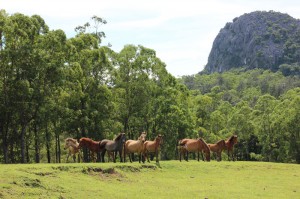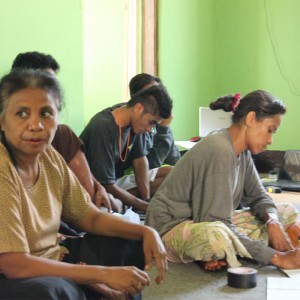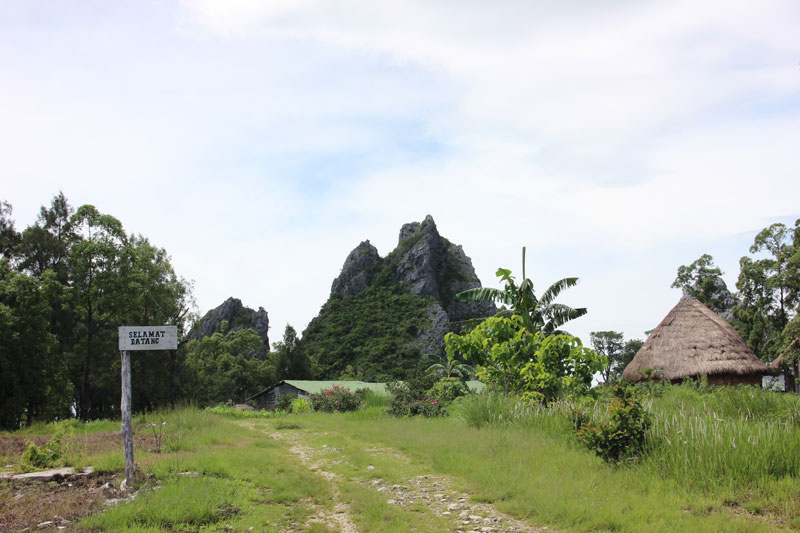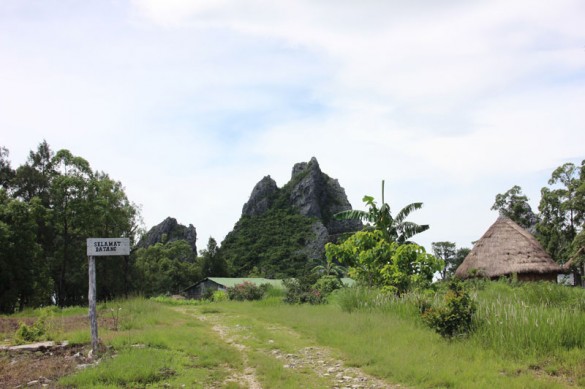Fine sunrays kiss the pine-covered hills and lush grasslands as our motorbikes swept through the rural dirt roads. There’s a glittering pond to my right and a herd of gorgeous brown horses grazing to my left. In the distance, I spotted two towering rocks peppered in shrubs. I had set my eyes on the first sights of Mollo.
I first learned about Mollo, a district in the highlands of Timor Tengah Selatan, at a cultural exhibition in Jakarta several years ago. The displays of colourful tenun ikat products reminded me that they came from somewhere in my maternal homeland of NTT. In the backdrop there was a cartoon on the story behind the textiles, on how “Mama” Aleta Baun courageously stopped the marble mines plundering her homeland’s sacred rock towers.
Having grown up in a mining compound, I believe mines have an interesting relationship to the natives of the lands where they operate. On one hand, it would be almost impossible to find goods in our modern urban civilisation whose production did not involve mined commodities. On the other hand, mining is not without serious impact on the lands where they operate and the people who have traditionally depended on that land for their livelihoods. So despite my awareness of my own dependence on the mining industry, I have come to respect communities who do stand up against it to protect their homelands.
Marble mining began in Mollo in 2004. The jobsites include Nausus, Naetapan, and Fatulik. “Our elders did not know what mining meant. They thought that the company was there to chisel an artwork out of the rocks,” said Aleta. When they realised what was really happening, the natives of Mollo formed the indigenous association Pokja OAT to fight against mining in their homeland.
According to a village elder, the mine initially approached the local tribal rajas to negotiate permission for operating in Mollo, but did not really involve otherwise important community leaders. The mine promised to build houses, power plants, schools and health clinics for the locals. But it didn’t take long for locals to notice the damage and suffer its consequences.
Long before the people of Mollo studied science, their ancestors had recognised Fatu Nausus as an important regulator of their homeland’s hydrology.
“The marble towers are porous and there’s vegetation growing on their surfaces. When it rains, the water trickles down those pores and follows the roots of the vegetation, forming wellsprings at the base of the rock,” explained Aleta. The Nausus wellspring, as well as those found at the bottom of other rocks in Mollo, become the water source of four major rivers in Timor. “Mollo is the heart of Timor,” said Aleta, likening the wellsprings of Mollo’s rocks to a heart pumping blood to the entire island.
The Timorese believe that rocks are a land’s bones, water is its blood, and the earth and forests its flesh. Being an agrarian society, depending on the land for its livelihood, the Timorese believe that disruptions to any of these elements will cause the earth to lose its power to sustain life.
Therefore, the Timorese believe that the ancestors entrusted them to look after the land and make sure that it remains capable of providing good livelihood for later generations. Timorese surnames are traditionally derived from sacred local rocks, waters, or forests—by bearing the surname, one professes himself or herself as a guardian of the element of nature after which the clan is named.
The soil in Mollo is sandy clay, so when rocks are removed, erosion easily occurs. “An entire village that lived under the rocks had to move,” said Aleta. “The water debit in the wellsprings decreased, and many disappeared altogether because the mine stripped our forests. We get floods in the rain, but safe water supply is difficult.”
The mines also caused a loss of habitat for monkeys, cuscus, civets, birds, and snakes.
“According to tradition, the base of the rock is grazing ground for livestock. Tradition forbids us from disturbing the rocks,” said Aleta. “Even the WWF and the government assigns the place as a conservation reserve and outsiders are not supposed to access it. But sometimes this country can be funny.”
Aleta attributed the mine’s closure to the consistent prayers and rituals of the people. The Timorese are known for their sacrament of trees. Sacred trees become a place for bees to build a beehive and produce honey. However, this ritual is sometimes used to declare war, as has happened between Mollo natives who support the mine and those who are against it. Perhaps, this familial enmity was the greatest of all the disasters that led to the mine’s closure.
Some members of the community also retaliated by wrecking company vehicles. However, seeing that violence did not solve the problem, the community decided to stand up for their rights in peace.
Marble mining in Mollo ceased in 2010. “The mines were closed by the power of the people,” said Aleta. Back then, the community organised a peaceful blockade of the mining site. Even though the police and the military were backing up the mine, the community outnumbered them.
“We refrained from committing anarchy, so the police thought twice about arresting us, lest we press charges. There’s no verbal abuse from either side. We simply made sure that their machines did not touch our rock.”
Today, four years after mining in Mollo, the natives actively engage in Pokja OAT to execute food security, community leadership in protecting natural resources, animal husbandry, gender empowerment, the advocacy of justice, and business co-operatives. Aleta said she hopes that these activities also serve as a means of making peace in the community and mending of familial bonds that were severed by the mining conflict.
In 2013 Mama Aleta was awarded the Goldman Prize for grassroots environmental activism.
“Yes, we do need development. But what we really need are land, water, rock, and forests. We do not need destruction,” said Aleta. “People tend to think of NTT as poor. But we do not need handouts. We don’t deny that we are behind in terms of electricity, infrastructure, and all those amenities of development. But we do not need to live in excess. That will only cause us to forget who we are, forget unity, and forget our community. We prefer to live in modesty.”
Timor Tengah Selatan
Country: Indonesia
Province: Nusa Tenggara Timur (NTT)
Land Area: 3,947.1 km2 (TTS) / 30,777 km2 (Timor island)
Highest Elevation: Mutis (near Fatumnasi, TTS) 2,427m amsl
Largest city: Soe
Population: 441,155 (2010 estimate)





